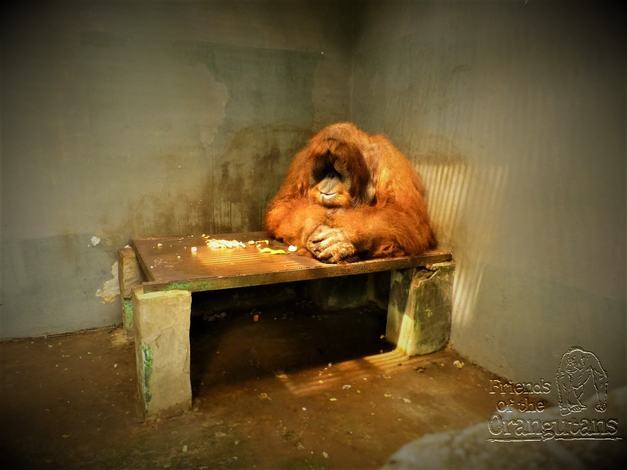Friends of the Orangutans • 23 Oct 2020
In December 2019 and February this year, two orangutans were born at Taiping Zoo & Night Safari, Malaysia. We contacted the zoo’s president in September to ask about its purpose for breeding orangutans.
In its response, the zoo stated that its reason for breeding the apes is to maintain “a viable captive [orangutan] population … in the event that there is a need for reintroduction to the wild.”
We believe the captive breeding of orangutans should stop everywhere.
On average, wild-born orangutans spend around seven to eight years with their mothers. The first few years of life are crucial as infant orangutans are taught a wide range of forest survival skills by their mothers. These include nest-building, avoiding predators, foraging and integrating into a wild orangutan population. The natural conditions in a forest are near-impossible to replicate in a captive setting.
The International Union for Conservation of Nature (IUCN) indicated in its guidelines for the wild reintroduction of great apes that it is a significant challenge to rehabilitate and release rescued infant orangutans that had not lived in the wild with their mothers for at least a year: such is the importance of mother-infant interactions in the wild.
Orangutans in zoos may also be too habituated to humans; over-habituation can cause forest-dwelling orangutans to be more susceptible to poachers and hunters. Additionally, captive-born and bred orangutans may not be as resistant to diseases as wild orangutans.
Breeding orangutans in captivity with the aim of releasing them into a forest is currently not common practice in the area of orangutan conservation. Moreover, the IUCN does not include any orangutan species in its species list for which captive breeding has been recommended as a conservation action.
We argue that the primary reason zoos import, breed and keep exotic animals – such as orangutans, chimpanzees and tigers – is the financial motive. The Aspinall Foundation put it bluntly: “[Zoos] are in the conservation of business and not in the business of conservation.”
In mid-September, the local council that manages Melaka Zoo, a zoo two hours south of the Malaysian capital Kuala Lumpur, stated that the zoo was attempting to acquire more orangutans to increase visitor numbers.
Orangutans are highly intelligent and complex animals, and it can be a challenge to meet their needs in captivity. To this day, we continue to reveal substandard living conditions of orangutans in Malaysian zoos.
Legitimate ape sanctuaries do their best to avoid animals in their care from breeding. According to the Center for Great Apes, an American sanctuary caring for unreleasable orangutans and chimpanzees, “it would be irresponsible to intentionally breed great apes and add more individuals to a life of captivity when there are already so many in need of rescue.”
Captive breeding of orangutans is not conservation, and breeding these sensitive and emotional animals to only hold them captive for life is unethical. Zoos around the world should stop breeding orangutans.
Instead of breeding orangutans in captivity, resources would be better spent on genuine orangutan conservation struggles such as protecting and connecting wild orangutan habitats, addressing human-orangutan conflict, and tackling the illegal wildlife trade. Advocacy support from the general public to courageously fight deforestation and the destruction of nature is crucial to secure the future of dwindling wildlife species.
If you too think that orangutans should not be bred in zoos, share this important article on your social media outlets, and send it to your local government officials and zoos and demand them to stop the captive breeding of orangutans.




